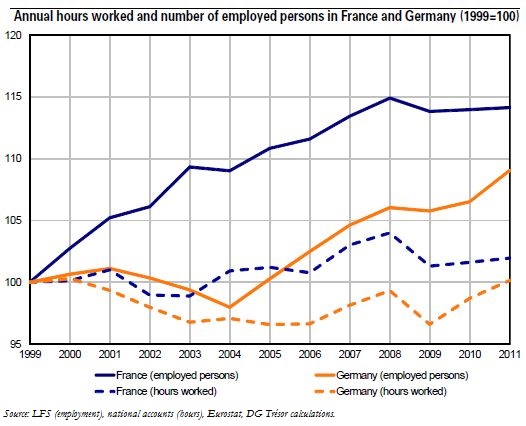Trésor-Economics No. 141 - Part-time work and work-sharing: a comparison between France and Germany
France and Germany post similar actual average annual working times of approximately 1,650 hours. This similarity, however, conceals a shorter average working time for full-time employees in France (about 200 fewer hours a year) and a higher proportion of part-time wage-earning jobs in Germany (26%) than in France (18%). In the past decade, both France and Germany recorded strong increases in the number of persons in employment (9.1% in Germany and 14.1% in France between 1999 and 2011) but the total volume of hours worked remained relatively stable. As a result, individual working time decreased in both countries, but in different ways: in France, through a decline in full-time working hours; in Germany, through a rise in part-time work.
Job creation has taken different forms. In France, by far the largest share of new jobs consists of full-time positions. In Germany, all new jobs are part-time positions, and full-time employment has actually fallen slightly. The robust growth in part-time work in Germany mainly concerns women. Germany also exhibits one of Europe's highest female employment rates, approximately 10 percentage points above the euro-area average. However, female employment rates expressed in full-time equivalent terms are similar in France and Germany. This is due to the smaller volume of hours worked by German women, which reflects the higher proportion of women in part-time positions.
In Germany, only a small proportion of part-time employment is reported as "involuntary" (17% versus 30.7% in France). Moreover, since 2005, the relative poverty rate of part-time employees has been, on the whole, lower in Germany than in France. There are several reasons for this, affording better protection of living standards for german part-time workers: multiple job-holding, a higher employment rate for spouses, a greater proportion of part-time jobs held by women living in a couple and more widespread use of flexible working-time arrangements than in France. This explains why most German respondents do not describe their part-time work as "involuntary". There are also cultural factors - it is argued - that make part-time work less of an "involuntary" experience for German mothers. There is a greater acceptance of constraints arising from the lack of care facilities for young children and thus a better acceptance of the difficulty of achieving the work-life balance in a full-time position.
